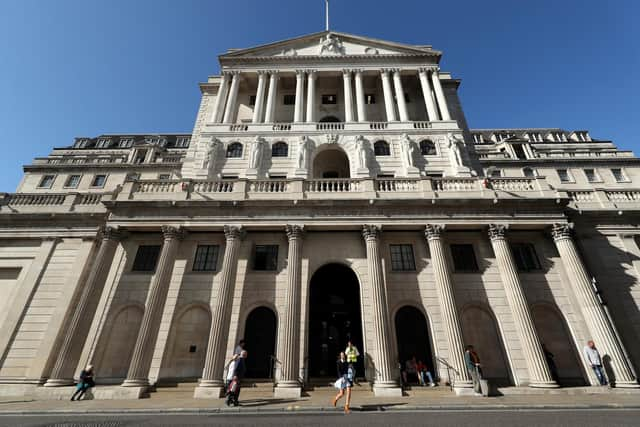Bank of England steps up bond-buying to avoid further financial turmoil
It announced yesterday that it would be doubling the daily limit on its gilt-buying programme to £10 billion, as the programme draws to a close on Friday, shortly followed by the Chancellor’s decision to bring forward his debt-reducing plan to the end of the month.
The Bank was forced to intervene with emergency action last month following the financial turmoil in response to Kwasi Kwarteng’s mini budget, and now has taken further steps to calm markets.
Advertisement
Hide AdAdvertisement
Hide AdIt announced that as well as boosting the daily limit on purchases of Government debt, it will also launch measures to help address the pension fund liquidity crisis which will run beyond the end of the week.


It had so far offered to buy £40 billion worth of UK Government bonds – known as gilts – but only purchased around £5 billion under the £65 billion programme.
Susannah Streeter, senior investment and markets analyst at Hargreaves Lansdown said: “Policymakers and politicians are clearly nervous about seeing a repeat of the mini-financial crisis unleashed following the presentation of the Truss administration’s slash and spend plans, and fresh moves are being made to try and repair the damage.”
She said there was “still much scepticism about the Government’s plans just as Kwasi Kwarteng prepares to head to the International Monetary Fund’s annual conference where his policies are set for fresh scrutiny”.
Advertisement
Hide AdAdvertisement
Hide AdIn addition to the mini budget's effect on the markets, the Chancellor has today been warned that he will have to cut public spending by more than £60 billion if he wants to get public finances back under control.
The Institute for Fiscal Studies (IFS) said that it would be impossible for Mr Kwarteng to deliver the amount of cuts needed to fund his tax pledges by “trimming the fat” of efficiency savings.
Analysts warned that unless the Government can come up with a credible plan to reduce debt, it could result in a worse crisis than 1976, when the then-Labour government was forced to seek a bailout from the International Monetary Fund (IMF).
In its “green budget” report ahead of Mr Kwarteng’s statement, the IFS said Government borrowing now looked set to hit almost £200 billion this year – around double the £99 billion that was forecast at the time of the last budget in March.
Advertisement
Hide AdAdvertisement
Hide AdMeanwhile an analysis by the investment bank Citi forecast that the economy is set to grow by an average of just 0.8% a year for the next five years – far short of the 2.5% “trend” rate of growth the Chancellor has said he wants to achieve.
The IFS said that on that basis, it would require a “fiscal tightening” of £62 billion in 2026–27 to stabilise debt levels – so even reversing all Mr Kwarteng’s mini-budget tax cuts would not be enough.
In an online briefing for journalists to accompany the report’s publication, IFS director Paul Johnson said that after 12 years of austerity, cuts on that scale were “extraordinarily hard to achieve”.